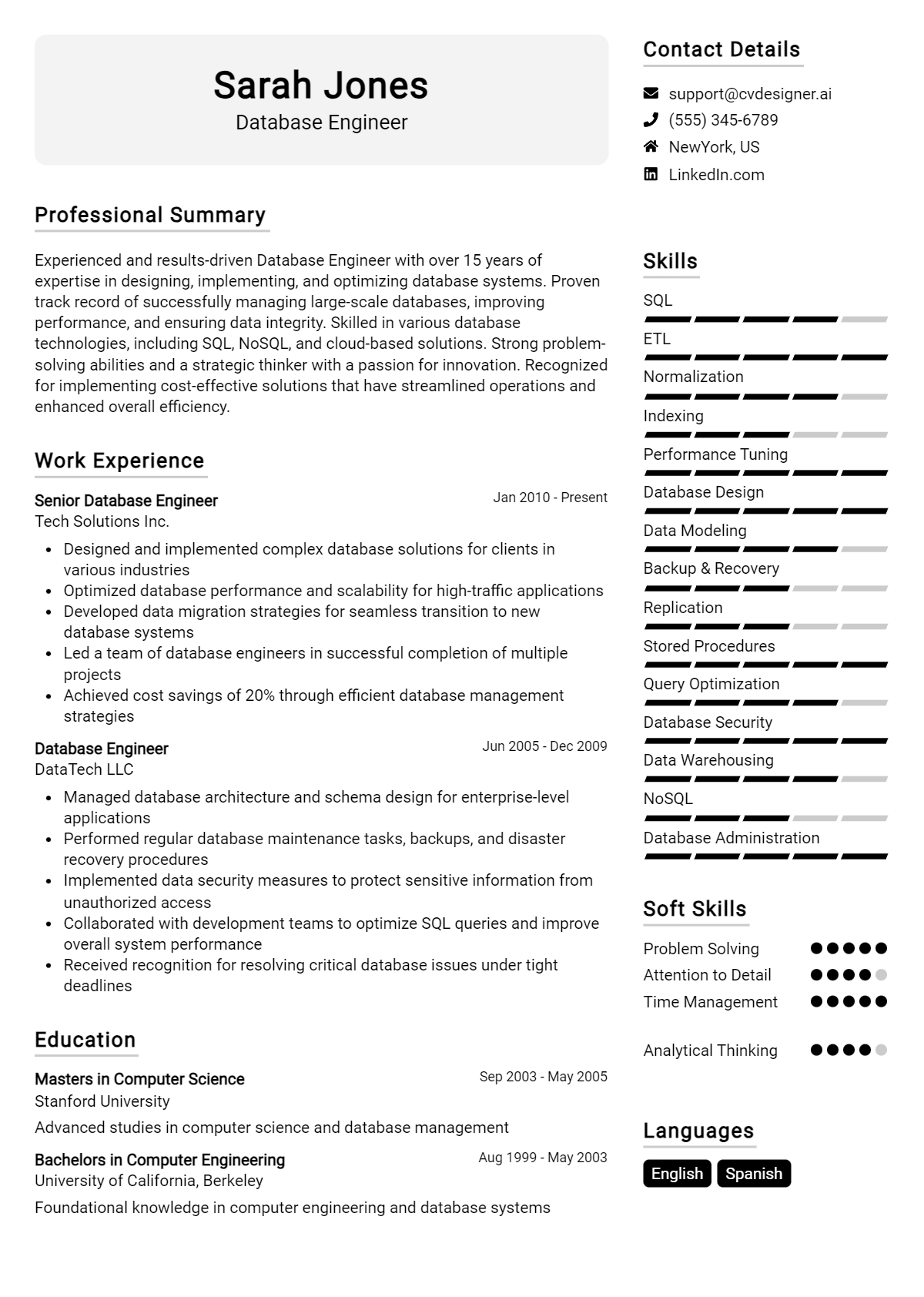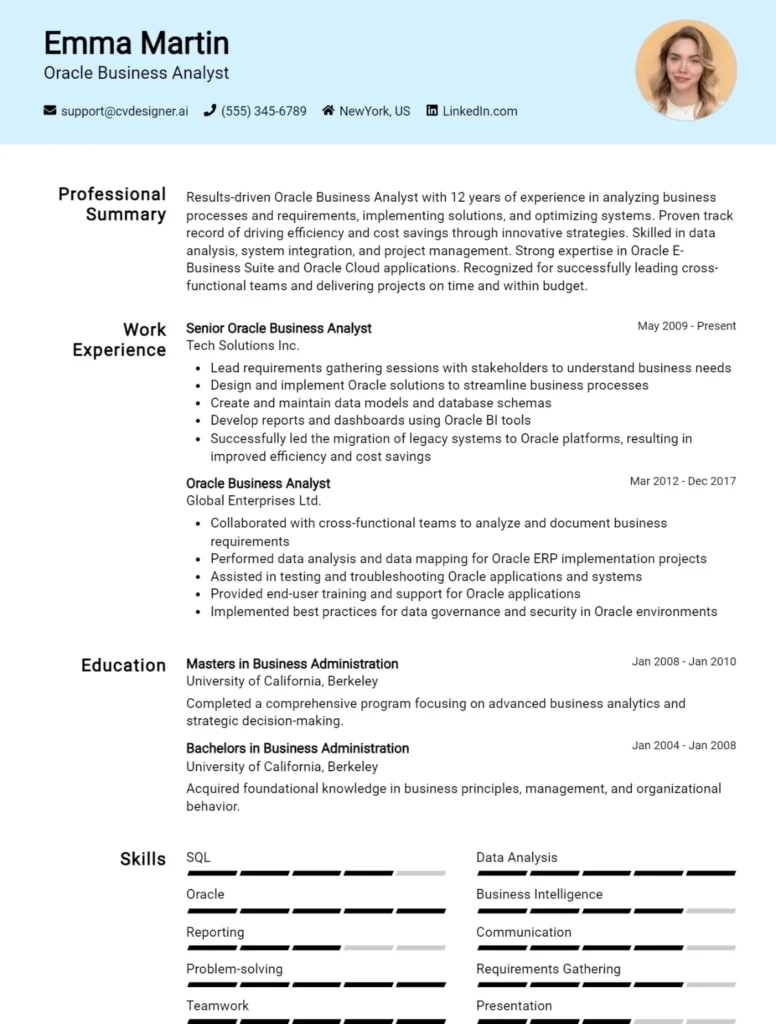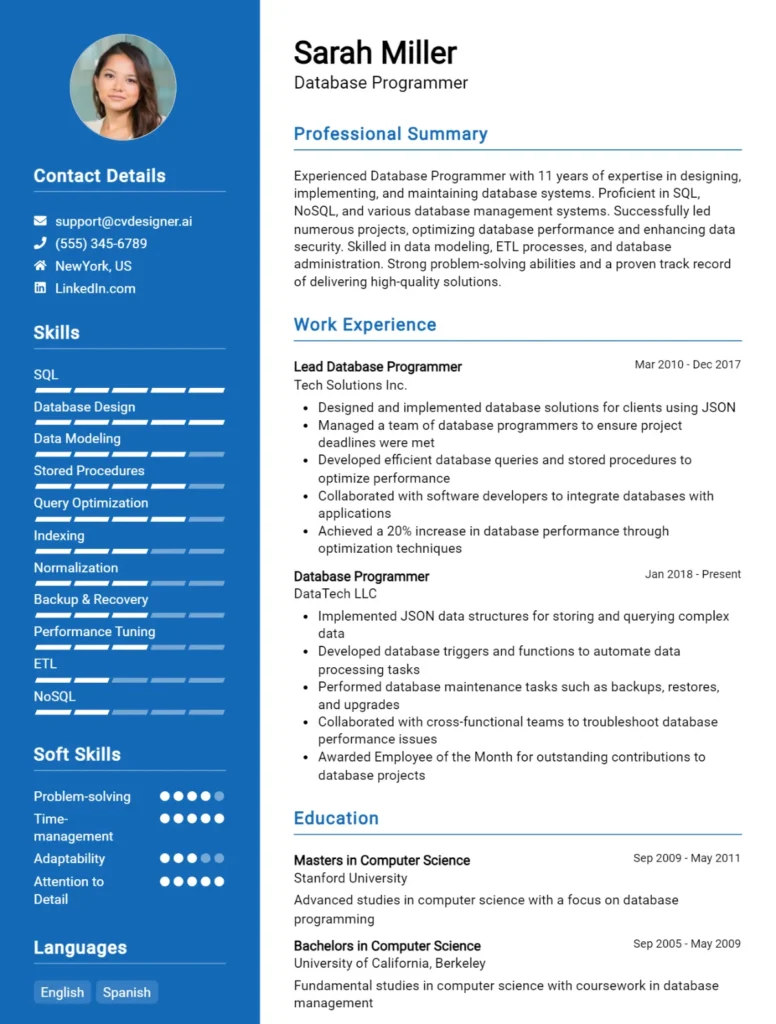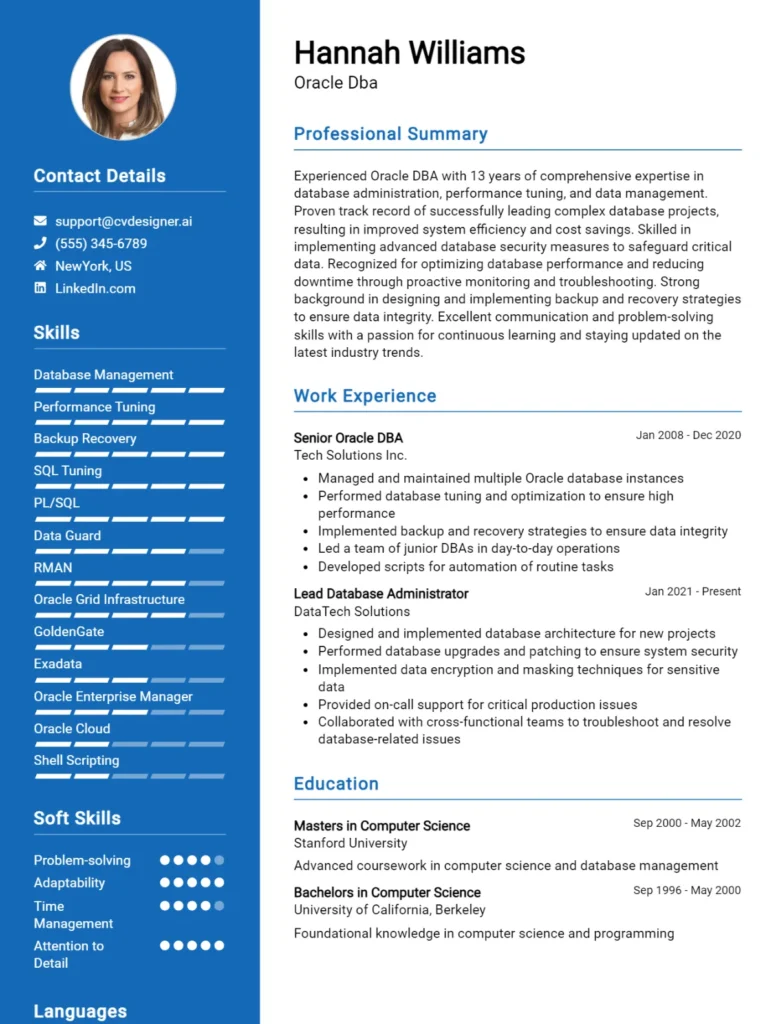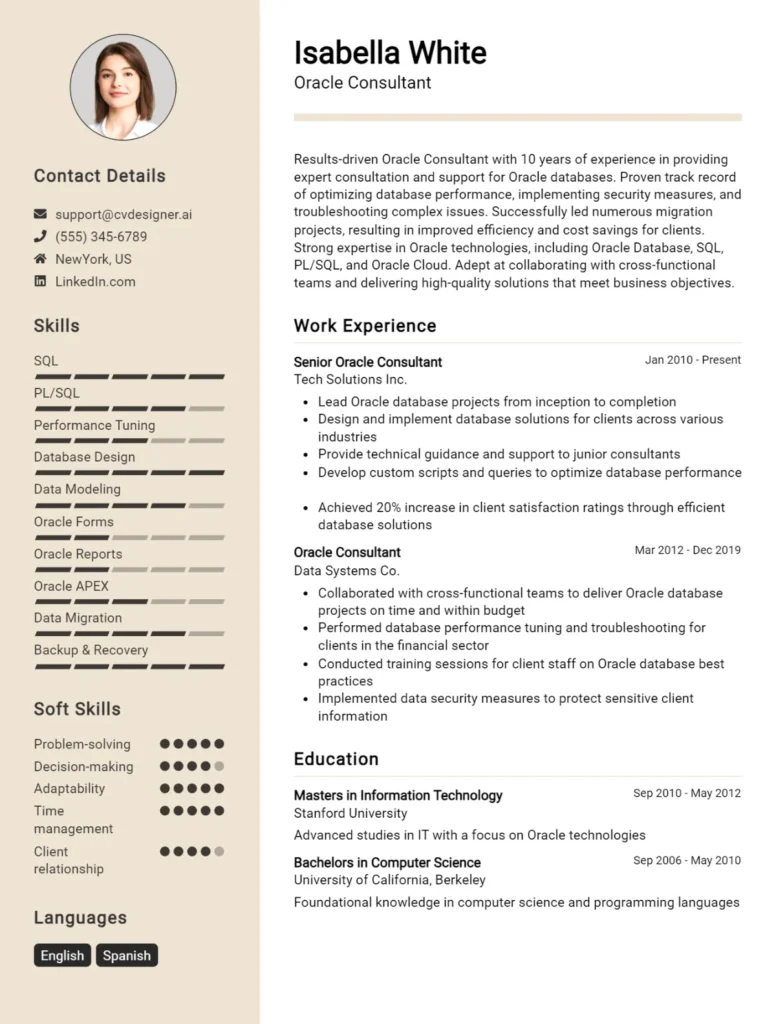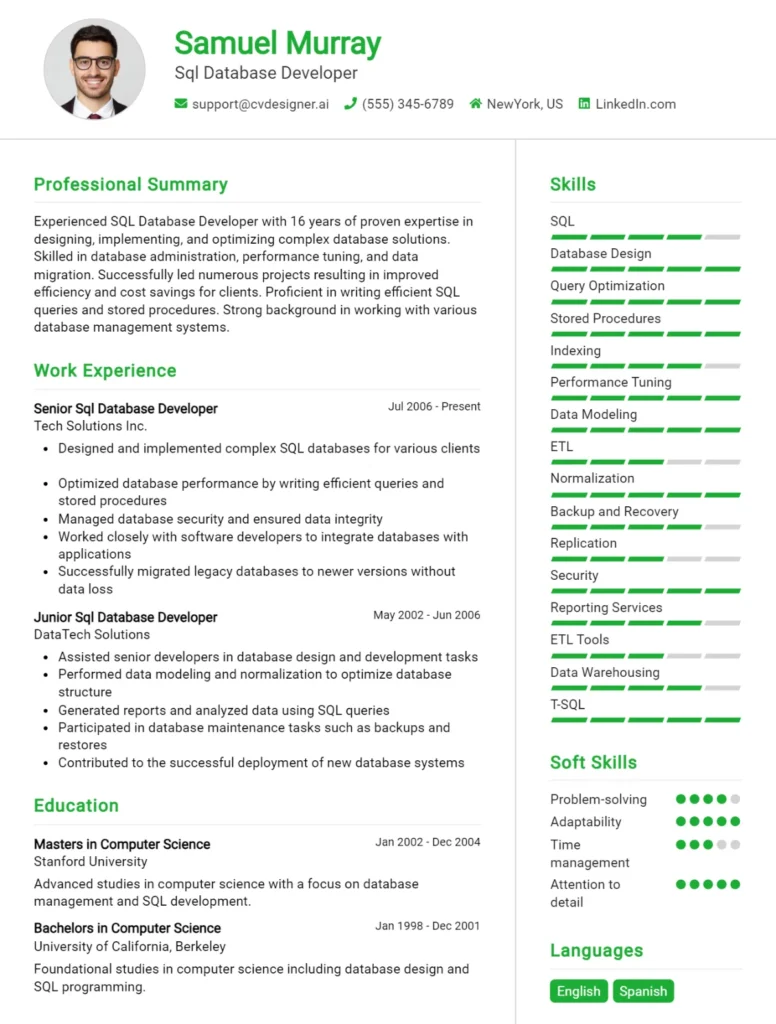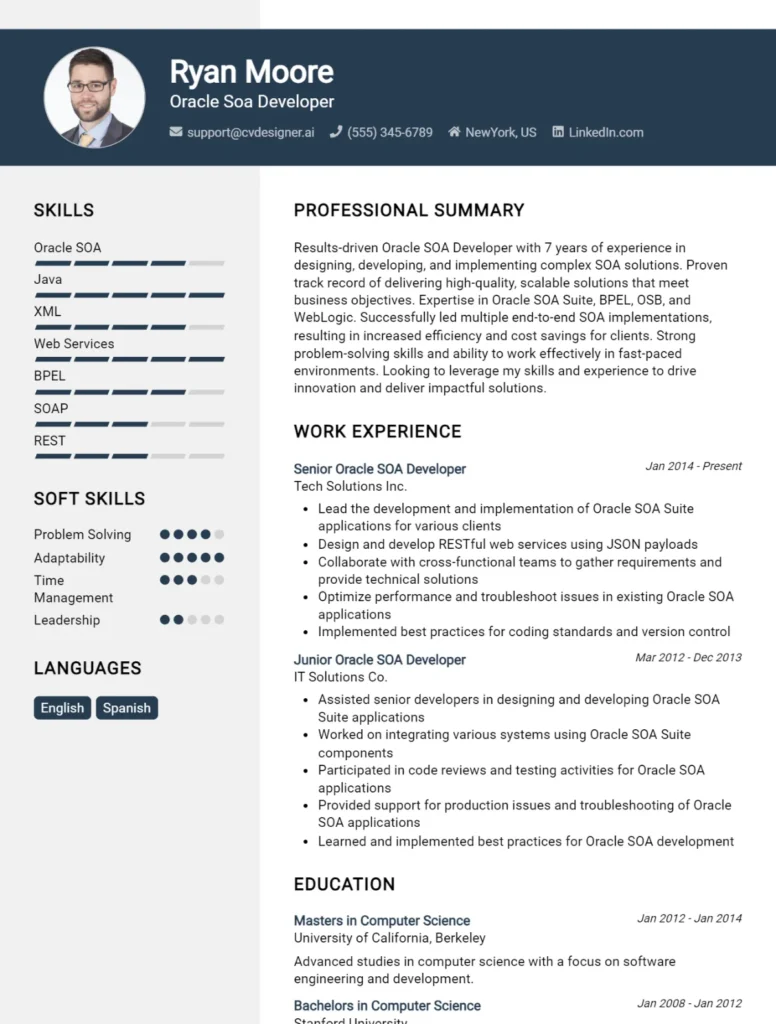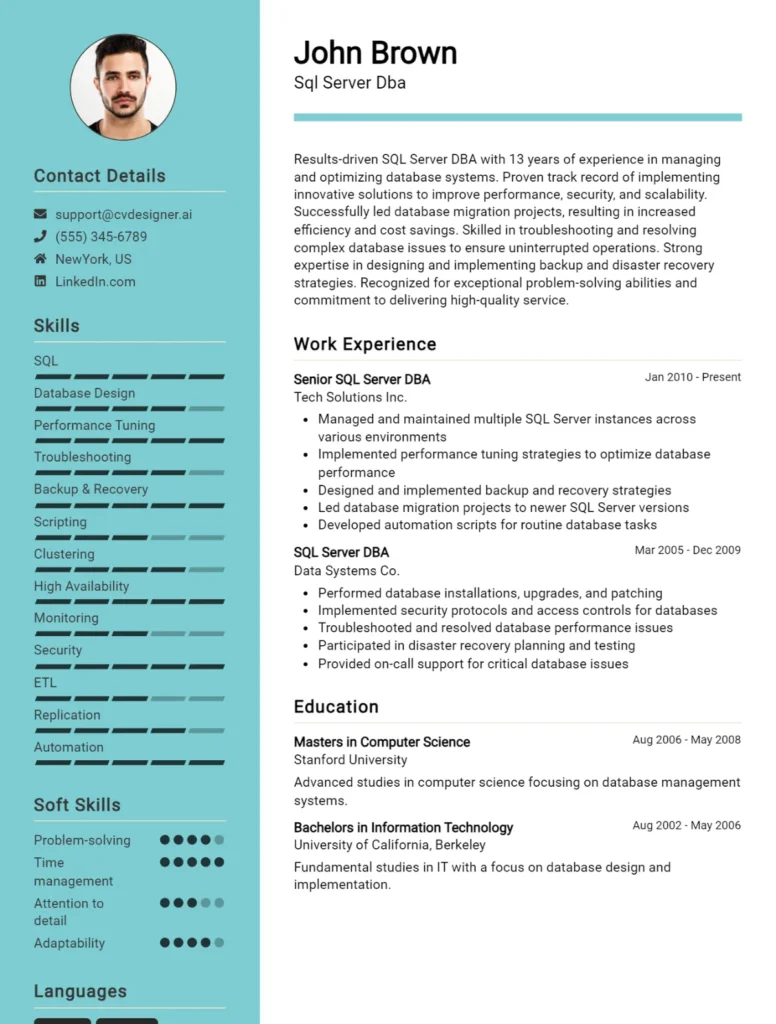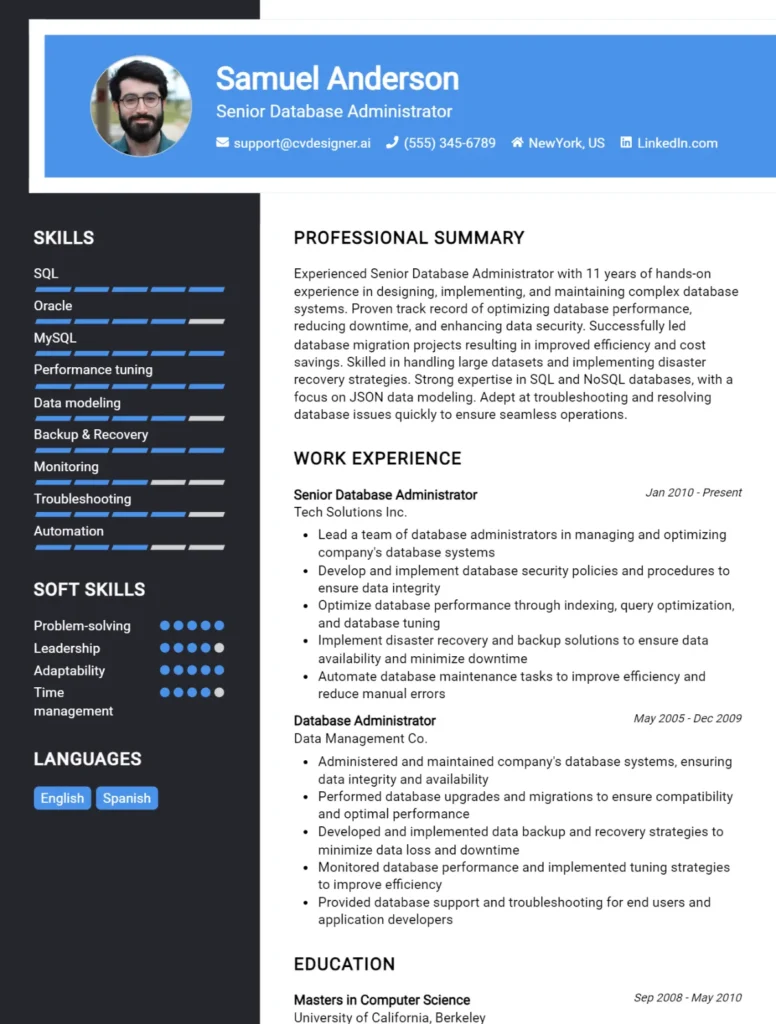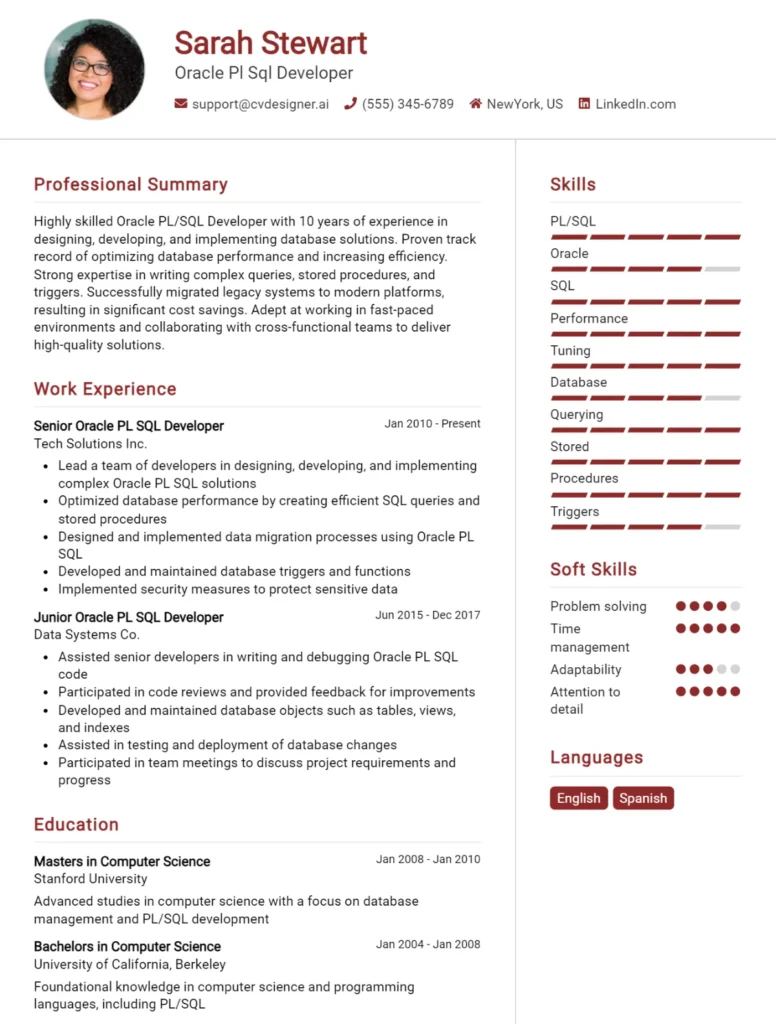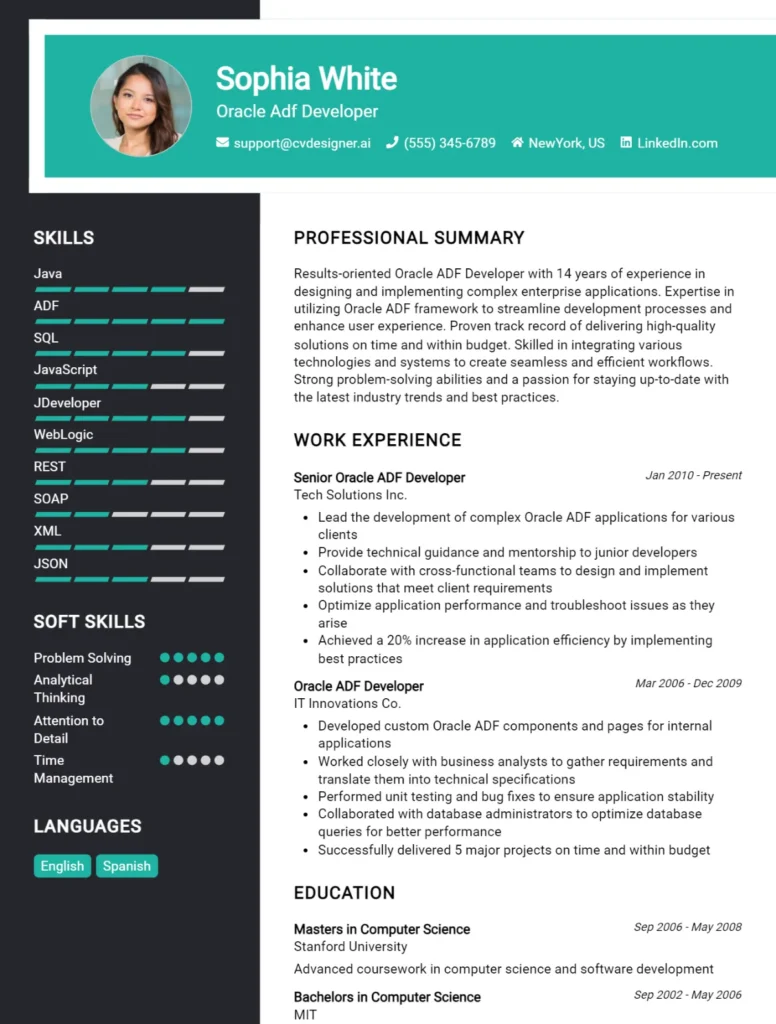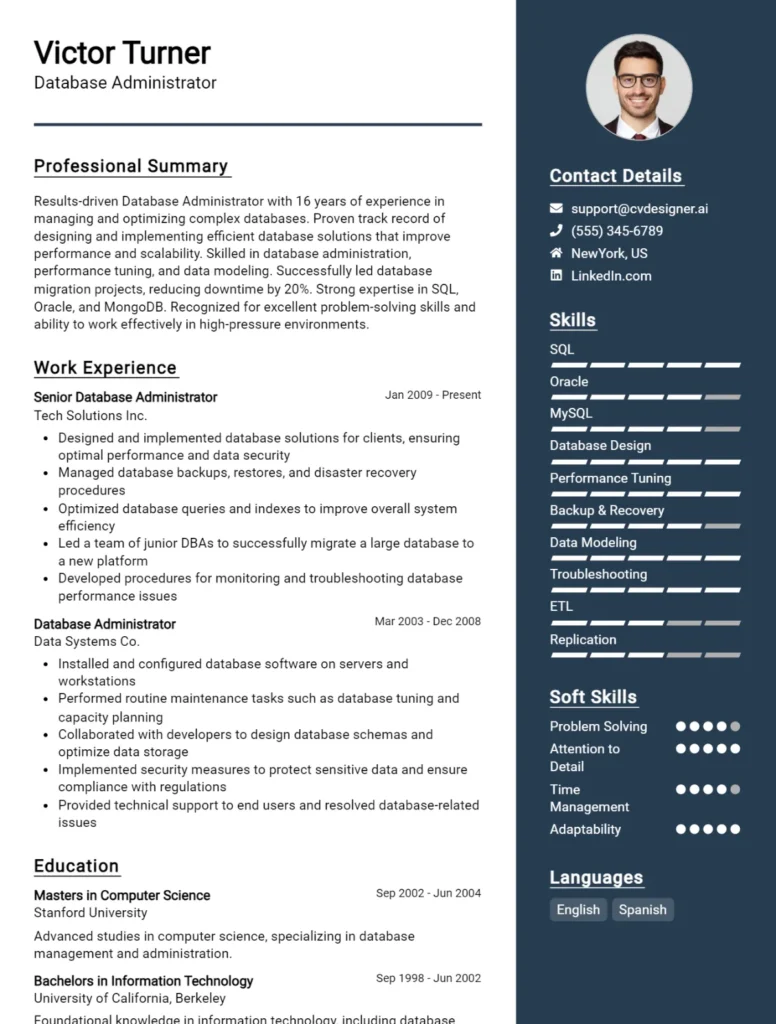Most Popular Database Engineer CV Examples
Explore additional Database Engineer CV samples and guides and see what works for your level of experience or role.
As the backbone of any data-driven organization, a Database Engineer plays a crucial role in designing, implementing, and maintaining robust database systems. Crafting an impressive CV is essential for standing out in this competitive field. In this comprehensive guide, we’ll walk you through the key components of an effective Database Engineer CV, ensuring you showcase your technical skills and experience in the best light. You’ll discover essential tips on how to highlight your expertise in database management systems, optimization techniques, and data security practices. Additionally, we’ll provide a practical CV example to guide you in formatting and structuring your own. Here’s what you can expect to learn:
- Key Skills: Identifying and emphasizing the most relevant skills for a Database Engineer role.
- Work Experience: How to effectively present your professional background and achievements.
- Education: Highlighting your academic qualifications and certifications in the field.
- Technical Proficiencies: Showcasing your familiarity with various database technologies and tools.
- CV Formatting: Tips on layout and design to make your CV visually appealing and easy to read.
- Common Mistakes: Avoiding pitfalls that could hinder your chances of landing an interview.
By the end of this guide, you will be equipped with the knowledge to create a compelling CV that attracts the attention of hiring managers and sets you on the path to success in your career as a Database Engineer.
What is a Database Engineer CV?
A Database Engineer CV is a crucial document that showcases a candidate's technical expertise, experience, and skills related to database management and engineering. This CV typically highlights proficiency in various database systems, such as SQL, NoSQL, and cloud-based databases, along with experience in designing, implementing, and optimizing database architectures. A well-crafted CV serves not only as a summary of qualifications but also as a marketing tool, making it imperative for candidates to present their achievements and problem-solving capabilities effectively. For tips on creating an impactful CV, consider referring to this comprehensive cv writing guide.
The importance of a Database Engineer CV extends beyond mere job applications; it reflects a professional's ability to communicate complex technical concepts clearly and succinctly. In a field where precision and attention to detail are paramount, a well-structured CV can make a significant difference in capturing the attention of hiring managers. Utilizing tools like a cv maker can streamline the creation process, ensuring that the document is not only visually appealing but also tailored to the specific demands of the database engineering role.
Key Components of a Database Engineer CV
- Contact Information: Clearly state your name, phone number, email address, and LinkedIn profile for easy communication.
- Professional Summary: A brief overview of your qualifications, experience, and career goals tailored to the database engineering field.
- Technical Skills: Highlight your proficiency in database management systems (DBMS), SQL, NoSQL, data modeling, and performance tuning. For a detailed list of essential skills, refer to skills.
- Certifications: Include any relevant certifications, such as Oracle Certified Professional, Microsoft Certified: Azure Database Administrator, or AWS Certified Database Specialty.
- Work Experience: Detail your previous roles, responsibilities, and achievements in database engineering. Focus on your contributions and the impact you made in each position. For more information, see work experience.
- Education: List your academic qualifications, including degrees, majors, and institutions attended. Consider including relevant coursework or projects.
- Projects: Describe significant database projects you've worked on, emphasizing your role, the technologies used, and outcomes.
- Database Design: Showcase your understanding of database architecture, normalization, and data integrity principles.
- Performance Tuning: Demonstrate your ability to optimize database performance through indexing, query optimization, and resource management.
- Data Security: Mention your knowledge of data protection measures, encryption techniques, and compliance with regulations such as GDPR.
- Collaboration and Communication: Highlight your experience working in cross-functional teams and your ability to communicate technical information to non-technical stakeholders.
- Continuous Learning: Emphasize your commitment to staying current with industry trends, emerging technologies, and ongoing professional development.
Sample Database Engineer CV for Inspiration
John Doe
123 Main Street
Anytown, USA 12345
(123) 456-7890
john.doe@email.com
LinkedIn: linkedin.com/in/johndoe
Professional Summary
Detail-oriented and analytical Database Engineer with over 6 years of experience in designing, implementing, and managing database systems. Proficient in various database management systems including MySQL, PostgreSQL, and Oracle. Strong expertise in database performance tuning, data modeling, and ETL processes. Demonstrated ability to translate business requirements into technical solutions, optimize database architecture, and ensure data integrity and security. Committed to continuous learning and staying updated with the latest industry trends.
Work Experience
Database Engineer
ABC Tech Solutions, Anytown, USA
March 2020 - Present
- Designed and maintained scalable database architectures for multiple applications, ensuring high performance and availability.
- Collaborated with software developers to optimize queries and improve application performance, resulting in a 30% reduction in average query execution time.
- Automated ETL processes using Python and Apache Airflow, improving data processing efficiency by 25%.
- Conducted regular database backups and implemented disaster recovery plans to ensure data safety.
- Developed comprehensive documentation for database systems and processes, facilitating knowledge transfer and training for junior staff.
Junior Database Engineer
XYZ Innovations, Anytown, USA
June 2017 - February 2020
- Assisted in the development and maintenance of MySQL and PostgreSQL databases for various projects.
- Participated in data migration projects, ensuring data integrity and minimal downtime.
- Created and optimized stored procedures and triggers to improve application functionality.
- Collaborated with cross-functional teams to gather requirements and provide database solutions that met business needs.
- Monitored database performance and implemented indexing strategies that improved response times by up to 40%.
Database Intern
Data Solutions Corp, Anytown, USA
January 2016 - May 2017
- Supported senior database engineers in the development and maintenance of relational databases.
- Assisted in data cleansing and validation processes to ensure high data quality.
- Learned to write SQL queries for data extraction and reporting, contributing to various analytics projects.
- Gained hands-on experience with database management tools and technologies.
Education
Bachelor of Science in Computer Science
University of Anytown, Anytown, USA
Graduated: May 2016
Skills
- Database Design & Architecture
- SQL & PL/SQL Programming
- Performance Tuning & Optimization
- ETL Processes & Data Warehousing
- Data Modeling & Schema Design
- Backup & Recovery Strategies
- Proficient in MySQL, PostgreSQL, Oracle, and MongoDB
- Familiarity with Cloud Databases (AWS RDS, Azure SQL)
- Strong Analytical & Problem-Solving Skills
- Excellent Communication & Team Collaboration
Publications
- Doe, J. (2023). "Optimizing SQL Queries for Enhanced Performance." Journal of Database Management, 29(3), 45-60.
- Doe, J. & Smith, A. (2022). "Best Practices in Database Security." International Conference on Data Protection, 12(1), 112-119.
Certifications
- Oracle Certified Professional, MySQL 8 Database Administrator
- Microsoft Certified: Azure Database Administrator Associate
- AWS Certified Database - Specialty
Database Engineer CV Writing Tips
When crafting a CV as a Database Engineer, it's essential to highlight both your technical skills and your practical experience in database management. Start with a strong summary that encapsulates your expertise in various database systems, such as SQL, NoSQL, and data warehousing. Tailor your CV to the job description, emphasizing relevant projects that showcase your ability to design, implement, and maintain databases efficiently. Use clear, concise language and bullet points to make your accomplishments stand out. Remember to quantify your achievements with metrics wherever possible, as this provides tangible evidence of your capabilities.
- Highlight Technical Skills: List specific database technologies you are proficient in, such as MySQL, PostgreSQL, Oracle, MongoDB, or Microsoft SQL Server.
- Showcase Relevant Experience: Include detailed descriptions of past roles, focusing on your responsibilities and achievements related to database design, optimization, and maintenance.
- Use Action Verbs: Start your bullet points with action verbs like "designed," "implemented," "optimized," or "managed" to convey your proactive contributions.
- Quantify Achievements: Provide metrics or outcomes for your projects, such as "improved query performance by 40%" or "successfully migrated 10 TB of data with zero downtime."
- Include Certifications: Mention any relevant certifications, such as Oracle Certified Professional or Microsoft Certified: Azure Database Administrator Associate, to validate your expertise.
- Tailor Your CV: Customize your CV for each job application by aligning your skills and experiences with the specific requirements of the role.
- Keep it Concise: Aim for a one to two-page CV, focusing on the most relevant information that showcases your qualifications.
- Proofread for Errors: Ensure your CV is free from grammatical errors and typos, as attention to detail is crucial in database engineering roles.
Database Engineer CV Summary Examples
As a Database Engineer, your CV summary should effectively highlight your technical skills, experience, and contributions to database management and optimization. Here are several examples to inspire your own summary:
Detail-oriented Database Engineer with over 5 years of experience in designing, implementing, and maintaining robust database systems. Proven expertise in SQL, NoSQL, and data warehousing solutions. Committed to optimizing performance and ensuring data integrity across multiple platforms.
Results-driven Database Engineer with a strong background in data modeling and ETL processes. Skilled in leveraging advanced database technologies to solve complex data challenges. Adept at collaborating with cross-functional teams to deliver efficient and scalable database solutions.
Innovative Database Engineer with extensive experience in cloud-based database architectures and big data technologies. Proficient in optimizing queries and enhancing database performance. Passionate about implementing best practices for data security and compliance.
Versatile Database Engineer with a solid foundation in relational and non-relational database management systems. Strong analytical skills complemented by a history of improving data retrieval times and storage efficiency. Excellent communicator with a track record of successful project delivery.
Dedicated Database Engineer specializing in database design, development, and troubleshooting. Experienced in database migration and integration projects with a focus on minimizing downtime and data loss. Eager to apply analytical skills to enhance database functionality and user experience.
Build a Strong Experience Section for Your Database Engineer CV
As a Database Engineer, showcasing your relevant work experience is crucial in demonstrating your technical skills and expertise in managing database systems. Below are examples of strong work experience descriptions that highlight key responsibilities and achievements in various roles.
- Developed and maintained complex SQL queries to extract, manipulate, and analyze data from multiple databases, resulting in a 30% improvement in reporting efficiency for cross-departmental projects.
- Designed and implemented database architecture for a high-traffic e-commerce platform, optimizing performance and reducing query response times by 50% through effective indexing and partitioning strategies.
- Collaborated with software development teams to integrate database solutions with application logic, ensuring seamless data flow and enhancing application performance by 40% through database optimization techniques.
- Led a data migration project, successfully transferring over 5TB of data from legacy systems to a new cloud-based database solution, ensuring data integrity and minimizing downtime during the transition.
- Conducted regular database performance tuning and optimization, identifying bottlenecks and implementing solutions that increased system performance and reliability, resulting in a 25% reduction in system outages.
- Developed and enforced database security protocols and best practices, leading to a 100% compliance rate with data protection regulations and significantly reducing security incidents.
- Created and maintained comprehensive documentation for database architectures, data models, and processes, improving team onboarding and knowledge transfer efficiency by 35%.
- Implemented automated backup and recovery solutions for critical databases, ensuring data availability and integrity while reducing manual intervention by 70%.
Database Engineer CV Education Examples
A well-rounded education is crucial for a Database Engineer, as it provides the foundational knowledge and skills necessary to design, implement, and maintain robust database systems. Below are several examples of educational backgrounds that are highly relevant to a career in database engineering:
- Bachelor of Science in Computer Science
This degree offers a comprehensive understanding of programming, algorithms, and data structures, which are essential for database management and optimization. - Bachelor of Science in Information Technology
Focusing on IT principles, this program covers database design, systems analysis, and network management, equipping graduates with the tools to handle various database technologies. - Bachelor of Science in Software Engineering
This program emphasizes software development processes, including database design and integration, making it highly relevant for database engineers who work closely with application development teams. - Master of Science in Data Science
A graduate degree in data science often includes extensive coursework on data management, database systems, and big data technologies, preparing students for advanced roles in database engineering. - Certification in Database Management Systems (DBMS)
Certifications from recognized institutions, such as Oracle Certified Professional or Microsoft Certified: Azure Database Administrator Associate, validate a professional's expertise in specific database technologies and enhance their employability.
Skills to Highlight in Your Database Engineer CV
As a Database Engineer, showcasing a balanced combination of soft and hard skills in your CV is essential to demonstrate your proficiency in database management and your ability to collaborate effectively within a team. Employers look for candidates who not only possess technical expertise but also the interpersonal skills necessary to thrive in a dynamic work environment. Below is a selection of important skills to highlight in your CV.
Soft Skills:
- Problem-solving: Ability to analyze issues and develop effective solutions.
- Communication: Strong verbal and written skills to explain complex concepts to non-technical stakeholders.
- Teamwork: Collaborating effectively with cross-functional teams to achieve project goals.
- Adaptability: Flexibility to adjust to new technologies and changing project requirements.
- Attention to Detail: Precision in data management and database design to ensure accuracy.
- Time Management: Prioritizing tasks and meeting deadlines in a fast-paced environment.
- Critical Thinking: Evaluating information and making informed decisions based on data analysis.
- Leadership: Guiding and mentoring junior team members and leading projects when necessary.
- Conflict Resolution: Navigating disagreements and finding mutually acceptable solutions.
- Customer Service: Understanding client needs and providing effective support for database-related issues.
Hard Skills:
- SQL Proficiency: Expertise in writing and optimizing SQL queries for data manipulation and retrieval.
- Database Design: Knowledge of data modeling, normalization, and schema design.
- Performance Tuning: Skills in optimizing database performance through indexing and query optimization.
- Data Warehousing: Experience in designing and managing data warehouses for analytics.
- Backup and Recovery: Proficiency in implementing backup strategies and data recovery procedures.
- Database Security: Understanding of security protocols and best practices for protecting sensitive data.
- ETL Processes: Familiarity with Extract, Transform, Load processes for data integration.
- NoSQL Technologies: Experience with NoSQL databases such as MongoDB or Cassandra.
- Cloud Database Management: Knowledge of cloud-based database solutions such as AWS RDS or Azure SQL.
- Scripting Languages: Proficiency in scripting languages like Python or Bash for automation tasks.
Database Engineer CV Format
When crafting a CV for a Database Engineer position, it's essential to tailor the format to align with your experience level. A well-structured CV showcases your technical proficiency, project experience, and contributions to past employers. The best format can vary based on whether you're an entry-level, mid-level, or senior Database Engineer.
For entry-level positions, a functional format that highlights skills and relevant coursework may be most effective. Mid-level professionals should consider a chronological format that showcases their career progression, while senior engineers might benefit from a combination format that emphasizes both their extensive experience and specialized skills.
- Start with a concise summary statement that highlights your expertise in database management and engineering.
- List your technical skills prominently, including database technologies (e.g., SQL, NoSQL), tools (e.g., Oracle, MongoDB), and programming languages (e.g., Python, Java).
- Include relevant work experience in reverse chronological order, detailing your responsibilities and achievements at each position.
- Highlight specific projects you have worked on, showcasing your problem-solving abilities and contributions to improving database performance or security.
- Mention any certifications or training relevant to database management, such as Microsoft Certified: Azure Database Administrator Associate or Oracle Database SQL Certified Associate.
- Don’t forget to include educational qualifications, emphasizing degrees in Computer Science, Information Technology, or related fields.
For more detailed guidance on CV formats, check out this cv format resource.
Common Mistakes to Avoid in a Database Engineer CV
When crafting a CV for a Database Engineer position, it's crucial to present your skills and experiences in a clear and compelling manner. A well-structured CV can significantly increase your chances of catching the attention of hiring managers. However, there are several common pitfalls that candidates often encounter which can detract from their overall presentation. Avoiding these mistakes will help ensure your CV stands out for the right reasons.
- Neglecting to Tailor Your CV: Failing to customize your CV for the specific job you're applying for can make it seem generic and may not highlight the most relevant skills.
- Overloading with Technical Jargon: Using too much technical language can alienate non-technical reviewers; balance technical terms with clear explanations.
- Lack of Quantifiable Achievements: Instead of just listing responsibilities, include specific accomplishments with measurable results to demonstrate your impact.
- Ignoring Soft Skills: Database engineering is not just about technical skills; including soft skills like communication, teamwork, and problem-solving is important.
- Omitting Relevant Certifications: Certifications related to database management systems (DBMS) or cloud technologies should be prominently displayed to validate your expertise.
- Poor Formatting and Structure: A cluttered, hard-to-read CV can distract from your qualifications; use clear headings and bullet points for easy navigation.
- Including Irrelevant Experience: Focus on your database-related experiences and skills; avoid including jobs that do not relate to the position you are applying for.
- Not Updating Regularly: Failing to keep your CV current with your most recent experiences and skills can lead to missed opportunities.
- Using Passive Language: Employ active language that showcases your contributions and achievements, making your CV more engaging and impactful.
- Ignoring Keywords from Job Descriptions: Not incorporating relevant keywords from the job listing can hinder your CV from passing through Applicant Tracking Systems (ATS).
Key Takeaways for a Database Engineer CV
- Contact Information: Clearly display your name, phone number, email address, and LinkedIn profile at the top of your CV for easy reference.
- Professional Summary: Write a concise summary highlighting your experience, skills, and what you bring to the database engineering role.
- Technical Skills: List relevant technical skills such as database management systems (e.g., MySQL, PostgreSQL, Oracle), SQL proficiency, data modeling, and ETL processes.
- Certifications: Include any relevant certifications, such as Microsoft Certified: Azure Database Administrator Associate or Oracle Database SQL Certified Associate.
- Work Experience: Detail your work history in reverse chronological order, focusing on achievements and responsibilities that demonstrate your expertise in database design, implementation, and maintenance.
- Projects: Describe significant projects you've worked on, emphasizing your role, the technologies used, and the outcomes achieved.
- Education: Mention your degrees, including the institution name and graduation date. Highlight any coursework relevant to database management.
- Soft Skills: Incorporate soft skills such as problem-solving, communication, and teamwork that are essential for collaboration with other IT professionals.
- Tailored Content: Customize your CV for each job application by incorporating keywords from the job description to pass through Applicant Tracking Systems (ATS).
- Professional Affiliations: If applicable, list memberships in professional organizations related to database management, which can enhance your credibility.
- Portfolio Links: If you have a portfolio of your work or projects, include links to relevant GitHub repositories or personal websites that showcase your skills.
- Additional Documents: Consider using cv templates for a professional look and a cv builder to create an appealing layout. Don’t forget to prepare a strong cover letter using cover letter templates to complement your CV.
Build your CV in minutes
Use an AI-powered cv builder and have your cv done in 5 minutes. Just select your template and our software will guide you through the process.
